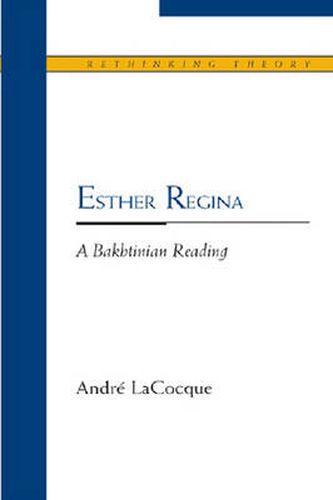Readings Newsletter
Become a Readings Member to make your shopping experience even easier.
Sign in or sign up for free!
You’re not far away from qualifying for FREE standard shipping within Australia
You’ve qualified for FREE standard shipping within Australia
The cart is loading…






Readers and scholars often question the inclusion of the
Book of Esther
in the canon. Where, they wonder, do the book’s flagrant displays of hatred, deceit, violence, and the antidotal grotesqueries of Purim figure in the biblical tradition? Such confusion, this book tells us, arises from a wrong appraisal of Esther’s literary genre. Distinguished scriptural scholar Andre LaCocque draws on the lessons of Russian critic Mikhail Bakhtin to reveal the true comedic nature of the story of Esther and Mordecai. In particular, LaCocque finds in the book’s grotesque elements - from royal banquets that last a half-year to an improbable succession of coincidences and reversals of fortunes neutralizing a planned genocide - a natural fit with Bakhtin’s description of the
carnivalesque.
Bakhtin’s rediscovery of the carnivalesque employs such key notions and categories as the dialogic, the novelistic, the chronotopic, the polyphonic, and authoring-as-creating. Using these and other Bakhtinian tools, LaCocque rereads Esther to show how the book’s comedic mood is paradoxically proportional to the catastrophic predicament of the Jews. Here, as biblical theocentrism shifts to Judeocentrism, we see how the carnivalesque becomes subversive of the Establishment and liberating. In
Esther , the underlying conviction is that Jewish survival is providential - and that anti-Semitism is anti-God. This is, as LaCocque tells us with a nod to Aristotle, a worthy lesson disguised as a
low genre.
$9.00 standard shipping within Australia
FREE standard shipping within Australia for orders over $100.00
Express & International shipping calculated at checkout
Readers and scholars often question the inclusion of the
Book of Esther
in the canon. Where, they wonder, do the book’s flagrant displays of hatred, deceit, violence, and the antidotal grotesqueries of Purim figure in the biblical tradition? Such confusion, this book tells us, arises from a wrong appraisal of Esther’s literary genre. Distinguished scriptural scholar Andre LaCocque draws on the lessons of Russian critic Mikhail Bakhtin to reveal the true comedic nature of the story of Esther and Mordecai. In particular, LaCocque finds in the book’s grotesque elements - from royal banquets that last a half-year to an improbable succession of coincidences and reversals of fortunes neutralizing a planned genocide - a natural fit with Bakhtin’s description of the
carnivalesque.
Bakhtin’s rediscovery of the carnivalesque employs such key notions and categories as the dialogic, the novelistic, the chronotopic, the polyphonic, and authoring-as-creating. Using these and other Bakhtinian tools, LaCocque rereads Esther to show how the book’s comedic mood is paradoxically proportional to the catastrophic predicament of the Jews. Here, as biblical theocentrism shifts to Judeocentrism, we see how the carnivalesque becomes subversive of the Establishment and liberating. In
Esther , the underlying conviction is that Jewish survival is providential - and that anti-Semitism is anti-God. This is, as LaCocque tells us with a nod to Aristotle, a worthy lesson disguised as a
low genre.